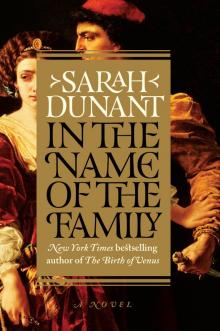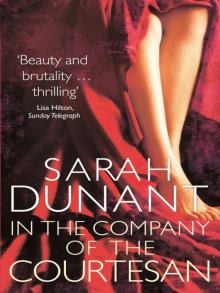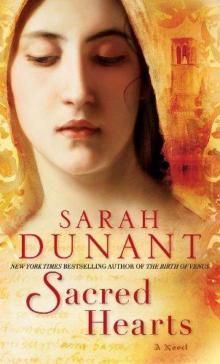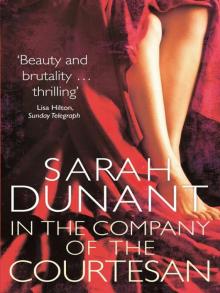- Home
- Sarah Dunant
Blood & Beauty Page 2
Blood & Beauty Read online
Page 2
But not so young that he could ever be allowed to forget. The only thing bloodier than the attack had been the retribution.
‘Luckily, he survived and prospered. Despite the della Rovere family,’ Rodrigo adds, smiling.
‘My father spoke highly of your keen mind, Vice-Chancellor. I know I shall learn a lot from you.’
‘Ah! You already have his wit and diplomacy, I see.’ And his smile dissolves into laughter. The candle on the table flutters in the wind of his breath and his generous features dance in the light. The younger man feels a bead of sweat moving down from his hair and wipes it away with his hand. His fingers come away grimy. In contrast, the Borgia cardinal remains splendidly unaffected by the heat.
‘Well, you must forgive me if I show a certain fatherly affection. I too have a son of your age who needs counsel as he climbs the ladder of the Church. Ah – but of course, you know this. The two of you studied together in Pisa. Cesare spoke often of you as a good friend. And an outstanding student of rhetoric and law.’
‘As I would speak of him.’
In public. Not in private. No. In private, the cocky young Borgia was too closeted by his Spanish entourage to be a friend to anyone. Which is just as well, since whatever money he put on his back (and there was always a sack of it; when he came to dine you could barely see the cloth for the jewels sewn on to it) a Borgia bastard could never be the social equal of a legitimate Medici. He was clever though, mentally so fast on his feet that in public disputation he could cut to the quick, pulling arguments like multi-coloured threads from his brain until black seemed to turn into white and wrong became just another shade of grey. Even the praise of his tutors seemed to bore him: he lived more in the taverns than the study halls. But then he was hardly alone in that fault.
The young Medici is glad of the shadows around them. He would not like such thoughts to be exposed to daylight. If the emblem on the Borgia crest is that of the bull, everyone knows it is the cunning of the fox that runs in the family.
‘Well, I admire your dedication and pursuit of goodness, cardinal.’ Rodrigo Borgia leans over and puts his hand gently on his knee. ‘It will loom large in God’s grace.’ He pauses. ‘But not, I fear, in the annals of men. The sad truth is that the times in which we live are deeply corrupt, and without a pope who can withstand the appetites of the wolves prowling around him, neither he nor Italy will survive.’
While the back of his hand lies thick as a slab of meat, his fingers are surprisingly elegant, tapered and well manicured, and for a second the younger man finds himself thinking of the woman who graces the Vice-Chancellor’s bed these days. A flesh-and-blood Venus she is said to be: milk-skinned, golden-haired and young enough to be his granddaughter. The gossip is tinged with disgust that such sweetness should couple with such decay, but there is envy there too; how easily beauty snaps on to the magnet of power, whatever a man’s looks.
‘Vice-Chancellor.’ He takes a breath. ‘If you are here to canvass my vote…’
‘Me? No, no, no. I am but a lamb in this powerful flock. Like you, I have no other wish but to serve God and our holy mother the Church.’ And now the older man’s eyes sparkle. They say that while Giuliano della Rovere has a temper fit to roast flesh, it is the Borgia smile that is more to be feared. ‘No. If I put myself forward at all it is only because, having seen such things before, I fear that a deadlock could push us into hands less capable even than my own.’
Giovanni stares at him, wondering at the power of a man who can lie so bare-facedly and still give the impression that his heart is in his voice. Is this then his secret? In these last few days he has had occasion to watch him at work; to notice how tirelessly he weaves in and out of the knots of other men, how he is first to help the elder ones to their cells, or to find the need to relieve himself when negotiations stick and new incentives are called for. A few times the younger man has walked into the latrines and found the conversation fall silent at his entrance. And almost always the Vice-Chancellor will be there himself, nodding and beaming over his large stomach with his tool held loosely in his hand, as if it was the most natural pose on earth for God’s cardinals to adopt in each other’s presence.
Inside the cell, the air feels as thick as soup. ‘Sweet Mary and the saints. If we are not careful we will boil alive as slowly as Saint Cyrinus.’ Rodrigo fans his face theatrically and digs inside his robes, holding out a glass vial with an intricate silver top. ‘Can I offer you relief?’
‘No, no thank you.’
He digs a finger inside and anoints himself liberally. As the young man catches the tang of jasmine, he remembers how he has detected remnants of it – and a few other scents – around the public spaces over the last few days. Does each camp, like a pack of dogs, identify itself by its smell?
The cardinal is making a business of putting the bottle back in his robes while he stands up to take his leave. Then, suddenly, he seems to change his mind.
‘Giovanni, it seems to me you are too much your father’s son not to recognise what is happening here. So I shall tell you something I have not made public.’ And he bends his large frame to get closer to the young man’s face. ‘Don’t be alarmed. Take it as a tribute to your family that I share it: a lesson as to how influence moves when the air grows as thick as stinking cheese. Della Rovere cannot win this election, however it may look now.’
‘How do you know that?’ the young man says quickly, the surprise – and perhaps the flattery – overcoming the reticence he had vowed to hold.
‘I know it because, as well as being able to count, I have looked inside men’s hearts here.’ He smiles, but there is less mirth in him now. ‘In the next public scrutiny the della Rovere camp will pick up more votes, which will put him ahead of Sforza, though not enough to secure victory outright. When that happens Ascanio Sforza, who would not make a bad pope, though he would favour Milan too much for Florence – and you – to ever stomach him, will start to panic. And he will be right to do so. Because a papacy controlled by della Rovere will be one that favours whoever pays it the most. And the money that he is using to buy his way there now is not even his own. You know where it comes from? France! Imagine. An Italian cardinal bought by France. You have heard the rumour, I am sure. Gross slander, you think, perhaps? Except that in this city slander is usually less foul than the truth.’ He gives an exaggerated sigh. ‘It would be disastrous of course: a foreign power sitting in the papal chamber. So, to sink his rival, Ascanio Sforza will turn to me.’
He stops as if to let the words sink in.
‘Because at that point I will be the only one who can stop the water from rushing downhill in that direction.’
‘Turn to you? But—’ I say it again, my son: until you become accustomed, you would do well to make use of your ears rather than your tongue. ‘But I thought…’ He trails off.
‘You thought what? That a Borrjja pope would be a foreigner too,’ he says, resurrecting the hawking guttural of his name. ‘A man who would advance only his family and be more loyal to Spain than to Italy.’ For a moment there is a flash of undisguised anger in his eyes. ‘Tell me – would a Medici pope care less about the Holy Mother Church because he loves his family and comes from Florence?’
‘Cardinal Borgia, it was not my intention—’
‘To offend me? No! And neither did you. Powerful families must speak openly to each other. I would expect no less.’
He smiles, only too aware that the comparison between the two could be read as offence the other way.
‘Yes, I am a Borgia. When I embrace my children we speak in our native tongue. But I defy anyone to say I am less Italian than those who would now put their noses into the French coffers. If the papal crown is up for sale – and as God is my witness I did not start such a process – then at least let us keep the sale inside this room.’ He sighs again and claps him on the shoulder. ‘Ah! I fear I have said too much. See! You have pulled the truth from me. Your father’s blood runs deep in your veins. Su
ch a politician he was! Always with one finger held up wet to the wind so that when he felt it changing he could move the sails to keep his ship of state on course.’
The young Medici does not answer. He is too impressed by the show. The politics of charm. Having grown up with a father who could turn vinegar to honey when it suited him, he knows better than most how it works; but this mix of geniality, cunning and theatrics is new even to him.
‘You are tired. Get some rest. Whatever happens it will not be settled until tomorrow at least. You know, I think my Cesare would look almost as fine as you inside scarlet robes.’ And the last smile is the brightest of all, possibly because there is no dissembling. ‘I can see you both standing together, tall and strong as cypress trees. Imagine what a fire such youth and energy would light under this deadwood of old men.’ And he lets out a gale of laughter. ‘Ah, the foolish pride of men who love their sons better than themselves.’
After he has gone the young man sits examining all that he has heard, but while he should be considering the next public scrutiny, he cannot get the image of Cesare Borgia in scarlet out of his mind. He sees him inside a tight knot of men, striding through the streets of Pisa as if every closed door will open to him before he has to knock, and even then he might not choose to go in. God knows the government of the Church is full of men who have only a passing acquaintance with humility, but however contemptuous or lazy (and he is too much his father’s son not to know his own failings), in public at least they make an effort to do what is expected of them. But never Cesare Borgia.
Well, whatever the Borgia arrogance, his father’s ambitions will fail him. He might be laden with Church benefices, but he will rise so far and no further. Canon law, which they have wasted years of their lives studying, is marvellously clear on this: though there are riches to be had for those born on the other side of the blanket, no bastard – even a papal one – can enter the Sacred College of cardinals.
Outside, people are gathering in readiness for supper. He hears Rodrigo Borgia’s laughter ringing out from somewhere in the main body of the room where the more public canvassing takes place. If the della Rovere camp is to gain votes before losing, then someone must be canvassing for him now, in order to make victory seem secure.
From under his robes he pulls out his father’s letter, the paper limp with a sweat that comes from more than the heat of the room. For the first time since he has set foot in the conclave, when he gets to his knees the prayers come from the heart.
CHAPTER 2
Next morning, the third scrutiny of the conclave takes place in the formal antechamber off the great chapel.
The count shows the della Rovere faction pulling ahead by a small but appreciable margin. Della Rovere sits stony-faced, too good a politician to give anything away, but Ascanio Sforza, who wears both his pleasure and his pain on his sleeve, registers his alarm immediately. He glances nervously in the direction of the Vice-Chancellor, but the Borgia cardinal keeps his eyes down as if in prayer.
Outside, the camps disperse in their different directions. Borgia takes his leave to visit the latrine. Sforza watches him go, moving nervously from one foot to another, as if his own bladder is about to burst. The doors have barely closed when he follows. When he comes out a few moments later he is ashen. His brother may rule over a swathe of northern Italy, but it is a different kind of muscle needed here. He disappears into the throng. After a while a few of his most powerful supporters also feel the call of nature. Finally, Borgia himself emerges. For once he is not smiling. It is the countenance of a man who seems resigned to the process of defeat. Except of course such a pose would be exactly what was called for if the losers were turning the tables on the winners before they knew it was happening.
Despite the locked doors, by the time darkness falls the news has slipped like smoke out of the Vatican palace and is gossip at the city’s richest dinner tables, so that all the great families, the Colonna, the Orsini and the Gaetani (each with their own interested cardinals in the fight), go to bed that night with the name of the della Rovere family rolling round their mouths, the winners dreaming of the spoils in their sleep.
Meanwhile, halfway between the Ponte Sant’ Angelo and the Campo de’ Fiori, darkness provides cover for another kind of business. The Borgia palace is known throughout Rome as a triumphant marriage of taste and money. It is not only the house of an immensely wealthy cardinal, but also the office of the vice-chancellorship, raising revenues for the papacy and a profitable accounting business in itself. Before the final scrutiny takes place, those who are paid to watch for such things claim they spot the stable doors at the side of the palace opening to let out a pack of animals. First comes a fast horse – a Turkish pure-bred, no less – carrying a cloaked rider. Following on are six mules. The horse has already reached the northern city gate while the mules still plod their way up one of Rome’s seven hills. But then silver makes a heavy load, even for beasts of burden. Eight bags of it, they say, each one packed long before, for so much money can never have been counted in one night. Its destination? The palace of Cardinal Ascanio Sforza. If defeat is bitter then there are ways to sweeten the taste it leaves behind.
Inside the conclave, the gold-painted stars in the Sistine Chapel ceiling look down on a night of high activity. Old and young, venal and saintly are all kept awake by the chatter of men. So much horse-trading is taking place that it is a wonder men do not come with abacuses under their robes, so they can work out the profit margins on the offered benefices faster. Once the tide starts to turn the trickle soon becomes a flood. Plates of food are left untouched. The wine is drained and there are calls for more to be passed through the hatch. Johannes Burchard, the German Master of Papal Ceremonies and a man of exquisite precision, notes each request and the time of it down in his book. What he himself thinks remains a secret between him and his diary.
It is the stillest, deadest time of night when the cardinals take their place in formal circle in their great, carved wooden chairs under canopies, each one embroidered with the crests of their individual benefices. The air is a mix of stale body odour, dust and heavy perfumes. Most of them are ragged with tiredness, but there is no mistaking the underlying excitement in the room. To be part of history is a heady business, especially if you can make a profit from it yourself.
The vote is taken in silence.
Now as the result is announced the room erupts into a loud ‘AAAAH’ in which it is not easy to distinguish fury from triumph. All eyes turn towards the Borgia cardinal.
Tradition calls for only a single word. ‘Volo.’ ‘I want.’ But instead this big man, fine-schooled in politics and subterfuge, leaps up from his seat, brandishing both his fists high in the air, a prize fighter with his greatest opponent at his feet.
‘Yes! Yes. I am the Pope…’ And he lets out a great guffaw of childish delight.
‘I AM THE POPE.’
‘HABEMUS PAPAM!’ ‘WE HAVE A POPE!’
At the palace window the figure pauses, gulping in the fresh night air. Now another figure joins him, arms outstretched with tightly closed fists, like a street magician about to deliver a trick. The hands unclench and a storm of paper scraps is released. They flutter down in the breaking light, a few catching on the dying embers of the torches and flaring up like drunken fireflies. Such a piece of theatre has never been seen in the history of a conclave and the people below jump and fight each other to catch them before they land. Those who can read screw up their eyes to decipher the words scribbled there. Others hear it from the voice.
‘… Rodrigo Borgia, Cardinal of Valencia, is elected Pope Alexander VI.’
‘Bor-g-i-a! Bor-g-i-a!’
The crowd goes wild at the name, the square fuller by the second as the news brings people running from the warren of steamy streets on either side of the Ponte Sant’ Angelo, the old stone bridge that crosses the Tiber. After such a wait, they would probably cheer the devil himself. Yet this is more than fickle love. The established famili
es of Rome may moan about tainted foreign blood and a language that sounds like hacking up phlegm, but those with nothing to lose warm to a man who opens his purse and palace at the drop of a feast day. And Rodrigo Borgia has been spending his way into Roman hearts for a long time.
‘BOR-G-I-A!’
Unlike many rich men, he always makes it clear how much he enjoys the giving. No discarded basement hangings or half-hearted generosity from this vice-chancellor. Oh no: when a foreign dignitary tours the city or the Church parades its latest relics, it’s always the streets outside the Borgia palace that are strewn with the freshest flowers, always his windows that unfurl the biggest, brightest tapestries, his fountain that turns water into wine faster and longer, his entertainments that tickle the most jaded palates with firework displays that light the night sky into the dawn.
‘BOR-G-I-A!’
It was barely six months ago when Rome celebrated the fall of Moorish Granada to the armies of Christendom. A triumph for his native Spain as well as for the Church, and he had opened his palace and turned his courtyard into a bullring, with such a frenzy of the sport that one of the bulls, goaded into madness, had run amok in the crowd, spearing half a dozen spectators on its horns. In swift retaliation it had been skewered by the young Cesare, his church garments discarded in favour of full matador finery. How he brought the raging bull to its knees and then severed its throat with a single knife-thrust was all anyone could talk about for days. That and the money paid out to the families of the two men who later died of their wounds. The purse of a wealthy old man and the athletic prowess of his strutting son. Generosity and virility entwined. What better advertisement could there be for the reign of a new pope?

 Mapping the Edge
Mapping the Edge The Birth of Venus
The Birth of Venus In the Name of the Family
In the Name of the Family Snowstorms in a Hot Climate
Snowstorms in a Hot Climate In the Company of the Courtesan
In the Company of the Courtesan Birth Marks
Birth Marks Transgressions
Transgressions Under My Skin
Under My Skin Blood & Beauty: A Novel of the Borgias
Blood & Beauty: A Novel of the Borgias Blood & Beauty
Blood & Beauty Sacred Hearts
Sacred Hearts In the Company of the Courtesan: A Novel
In the Company of the Courtesan: A Novel